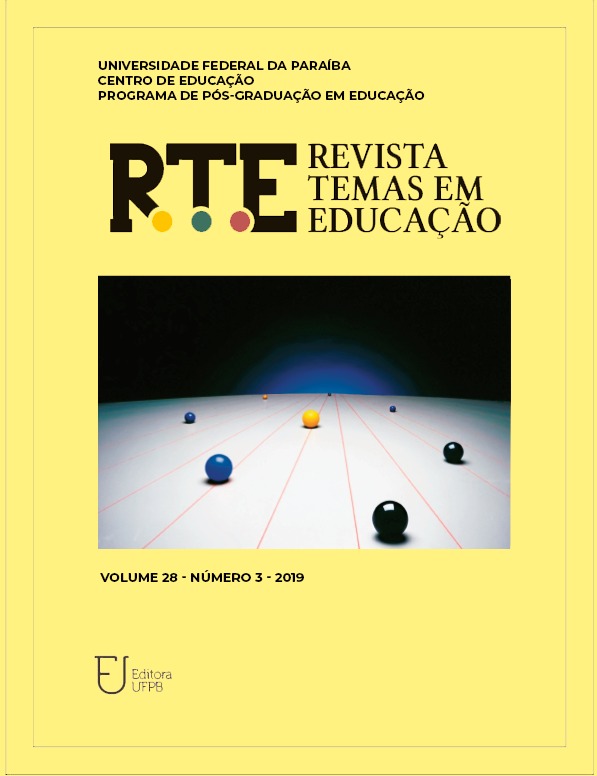DIGITAL TECHNOLOGIES AND THE DEVELOPMENT OF HUMAN CREATIVITY IN QUESTION
DIGITAL TECHNOLOGIES AND THE DEVELOPMENT OF HUMAN CREATIVITY IN QUESTION
DOI:
https://doi.org/10.22478/ufpb.2359-7003.2019v28n3.46740Keywords:
Creativity, Technologies, EducationAbstract
The present study, of a reconstructive hermeneutic approach, aims to identify the dimensions of human creativity that serve to enhance technologies in educational practices, by the bias of recognizing creative participation in the renewal of in order to rebuild teaching and learning processes. The appreciation of creativity is moving with the pedagogical ideals of renewing educational practices and can be conceived as a human potential that expands horizons of recreation and not only of applied reproduction of technical knowledge, which makes it difficult to mobilization of thinking and inhibits creative expression. We conclude that through technological resources in the classroom it is possible to act and rebuild pedagogical projects, in view of the multiple possibilities of learning and producing knowledge in the social sphere, transforming contexts and manifesting the necessary knowledge for educational practices with technologies
Downloads
References
ALENCAR, E. M. L. S. Criatividade. Brasília: Editora Universidade de Brasília, 1993.
ALENCAR, E. M. L. S. Como desenvolver o potencial criador e criatividade. São Paulo: Makron Books, 1996.
AMANTE, L. As tecnologias digitais na escola e na educação infantil. Pinhais, PR: Editora Melo, 2011.
BRASIL. Ministério da Educação. Secretaria da Educação Média e Tecnológica. Parâmetros Curriculares Nacionais Ensino Médio - Ciências da Natureza, Matemática e suas Tecnologias. Brasília: MEC, 2012.
BOHM, D. Sobre a criatividade. Trad. Rita de Cássia Gomes. São Paulo: Ed. Unesp, 2011.
COUTINHO, L. M. Aprendizagem, tecnologia e educação a distância. Módulo I, v. 3. Eixo Integrador: Realidade Brasileira. Brasília: UnB, 2002.
FREIRE, P. Extensão ou Comunicação? Trad. Rosisca Darcy de Oliveira. Rio de Janeiro: Paz e Terra, 1977.
FREIRE, P. Pedagogia do Oprimido. 41. ed. Rio de Janeiro: Paz e Terra, 2005.
HABERMAS, J. Passado como futuro. Trad. Flávio Beno Siebeneichler. Rio de Janeiro: Tempo Brasileiro, 1993.
HABERMAS, J. Técnica e Ciência como Ideologia. Trad. Artur Morão. Lisboa: Dom Quixote, 1994.
HABOWSKI, A. C.; CONTE, E.; TREVISAN, A. L. Por uma cultura reconstrutiva dos sentidos das tecnologias na educação. EDUCAÇÃO & SOCIEDADE, Campinas, v. 40, p. 1-15, 2019. Disponível em: <http://www.scielo.br/scielo.php?script=sci_arttext&pid=S0101-73302019000100802&lng=pt&nrm=iso>. Acesso em: 08 maio 2019.
KNELLER, G. F. Arte e ciência da criatividade. 4. ed. São Paulo: IBRASA, 1976.
LÉVY, P. Cibercultura. São Paulo: 34, 1999.
LIMA JUNIOR; A. S. de. Tecnologias inteligentes e educação: currículo hipertextual. Rio de Janeiro: Quartet; Juazeiro, BA: FUNDESF, 2005.
LUBART, T. Psicologia da Criatividade. Trad. Márcia Conceição Machado Moraes. Porto Alegre: Artmed, 2007.
MARTÍNEZ, A. M. Criatividade e saúde nos indivíduos e nas organizações. In: VIRGOLIM, A. R. (org.). Talento criativo. Expressão em múltiplos contextos. Brasília: Ed. UnB, pp. 53-64, 2007.
MARTÍNEZ, A. M. A criatividade na escola: três direções de trabalho. Linhas Críticas, v. 8, Brasília, junho-dezembro de 2002.
MARTÍNEZ, A. M. Criatividade, Personalidade e Educação. Campinas: Papirus, 2000.
MORAN, J. M. Ensino e aprendizagem inovadora com tecnologias audiovisuais e telemáticas. 8 ed. Campinas: Papirus, 2004.
MORAN, J. M. A educação que desejamos: Novos desafios e como chegar lá. 3. ed. Campinas, SP: Papirus, 2007.
SHAVININA, L. V. The international handbook on innovation. Oxford: Elsevier Science, 2003.
TAKAHASHI, T. (org.). Sociedade da informação no Brasil: livro verde. Ministério da Ciência e Tecnologia, Brasília: MEC, 2000.
VALENTE, J. A. Pesquisa, comunicação e aprendizagem com o computador. O papel do computador no processo ensino-aprendizagem. TV escola - Salto para o Futuro. Pedagogia de Projetos e Integração de Mídias. MEC: Secretaria de Educação a Distância, pp. 18-30, setembro 2005.
WESCHSLER, S. M. Criatividade: descobrindo e encorajando. Campinas, SP: Editora Psy, 2002.
Downloads
Published
How to Cite
Issue
Section
License
Authors who publish in this journal agree to the following terms:
. Authors retain the copyright and grant the journal the right to first publication, with the work simultaneously licensed under the Licença Creative Commons Attribution that allows the sharing of the work with acknowledgment of authorship and initial publication in this magazine. . Authors are authorized to assume additional contracts separately, for non-exclusive distribution of the version of the work published in this journal (eg, publishing in institutional repository or as a book chapter), with acknowledgment of authorship and initial publication in this journal.
. Authors are permitted and encouraged to publish and distribute their work online (eg in institutional repositories or on their personal page) at any point before or during the editorial process, as this can generate productive changes, as well as increase impact and citation of the published work (See O Efeito do Acesso Livre).



















